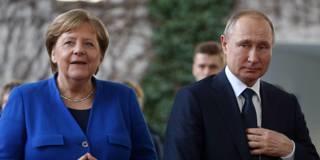Following decisions by both Russia and Turkey to involve themselves in Libya's civil war, Germany and France have responded with their own diplomatic initiatives, and the European Union has been left playing a bit part. But by violating the spirit, if not the letter, of the Treaty of Lisbon, EU member states merely weaken themselves.
BERLIN – Reporting on a recent conference in Berlin to discuss the conflict in Libya, one of Germany’s largest newspapers, Frankfurter Allgemeine Zeitung, notes that, “the days when America dominated the Middle East are over.” For more than a decade, the United States has been pulling back, forcing Europe to unfurl its own protective umbrella, either through the European Union or through the foreign policies of individual member states. It is now clear that the second option is winning out. Recent developments in Iran and Libya show that the EU has ceased to be a relevant force in international affairs.
After all, it is generally forgotten that the 2015 Iran nuclear deal included not only the P5+1 – the US, China, Russia, France, and the United Kingdom (the five permanent members of the United Nations Security Council) plus Germany – but also the EU. And for good reason: while the EU regards that deal as its greatest diplomatic victory, since the US abandoned the agreement in May 2018, France, Germany, and the UK have been the ones working to salvage it. The EU has mostly stuck to issuing bland press statements, which have the unintended effect of confirming its lack of real influence.
The situation in Libya is symptomatic of the larger problem. Both Turkey and Russia have now involved themselves in that country’s civil war (on opposing sides) to further their own national interests, in the process threatening to unleash a flood of refugees.

BERLIN – Reporting on a recent conference in Berlin to discuss the conflict in Libya, one of Germany’s largest newspapers, Frankfurter Allgemeine Zeitung, notes that, “the days when America dominated the Middle East are over.” For more than a decade, the United States has been pulling back, forcing Europe to unfurl its own protective umbrella, either through the European Union or through the foreign policies of individual member states. It is now clear that the second option is winning out. Recent developments in Iran and Libya show that the EU has ceased to be a relevant force in international affairs.
After all, it is generally forgotten that the 2015 Iran nuclear deal included not only the P5+1 – the US, China, Russia, France, and the United Kingdom (the five permanent members of the United Nations Security Council) plus Germany – but also the EU. And for good reason: while the EU regards that deal as its greatest diplomatic victory, since the US abandoned the agreement in May 2018, France, Germany, and the UK have been the ones working to salvage it. The EU has mostly stuck to issuing bland press statements, which have the unintended effect of confirming its lack of real influence.
The situation in Libya is symptomatic of the larger problem. Both Turkey and Russia have now involved themselves in that country’s civil war (on opposing sides) to further their own national interests, in the process threatening to unleash a flood of refugees.